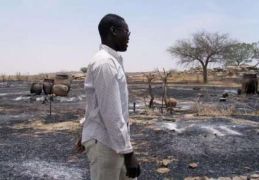INTERVIEW-Sudan forms special court for Darfur crimes
By Opheera McDoom
KHARTOUM, June 12 (Reuters) – Sudan has formed a special court to try alleged criminals in its remote Darfur region and its chief judge insisted on Sunday it would be independent, amid international pressure for war crimes trials abroad.

|
|
A displaced Sudanese man looks at his destroyed house after militiamen burnt the Sereaf village, in west Darfur along the Sudan and Chad border, April 22, 2005. (Reuters). |
The president of the court, due to start work on Wednesday, told Reuters he would be ready to try anyone, no matter how senior, and said he would resign if there was any government interference in the court proceedings.
“Nothing that will interfere with our work has ever happened nor will happen and if it ever happens I as a judge will quit the court,” Mahmoud Mohamed Saeed Abkam, who is also one of the roving court’s three judges, said in an interview.
Senior government and military officials, militia and rebel leaders, and foreign army officers are among 51 war crimes suspects on a secret list drawn up by a United Nations-appointed commission of inquiry into the Darfur conflict.
Tens of thousands of people have been killed and more than two million driven from their homes since a rebellion against Khartoum began more than two years ago in the region.
Abkam, a High Court judge, said he would be prepared to try anyone, whether they be senior government or military officials.
But, he said, he did not yet know who would come up for trial because the Attorney-General’s office was dealing with the investigations and bringing charges.
These mainly concerned rape, but also destruction of property, robbery and the looting of animals, he said, adding that one of his two colleagues would be a woman.
“As most of the cases we are going to try are bearing on allegations of rape we felt that…we would relieve the feeling of embarrassment on the part of the victims with having a female judge,” Abkam said.
The U.N. Security Council has asked the International Criminal Court (ICC) to investigate alleged war crimes in Darfur. The U.N.-appointed commission said the Sudanese judiciary was not independent enough to hold credible trials for alleged war crimes in Darfur.
Sudan has rejected any outside trials of Sudanese citizens, saying it would conduct its own trials. It has also pledged to try two foreign aid workers over allegations of hundreds of rapes in Darfur, although the foreign minister said later he would work out a solution to the issue with the U.N.
Abkam, a judge at the Sudanese High Court, said he and his two colleagues, who are from the court of appeal, would hold their first sitting in the capital of South Darfur state.
“The court will start on June 15 in Nyala,” Abkam, 67, said, adding that it would be moving to different parts of Darfur, depending on where there were cases to be tried. Its proceedings would be public.
The treaty which formed the ICC states that any citizen tried in a fair and credible national trial may not be eligible for retrial in the ICC.
The U.N.-appointed commission of inquiry said heinous crimes against humanity may have taken place in Darfur, although it stopped short of echoing the United States in describing the violence as genocide.
